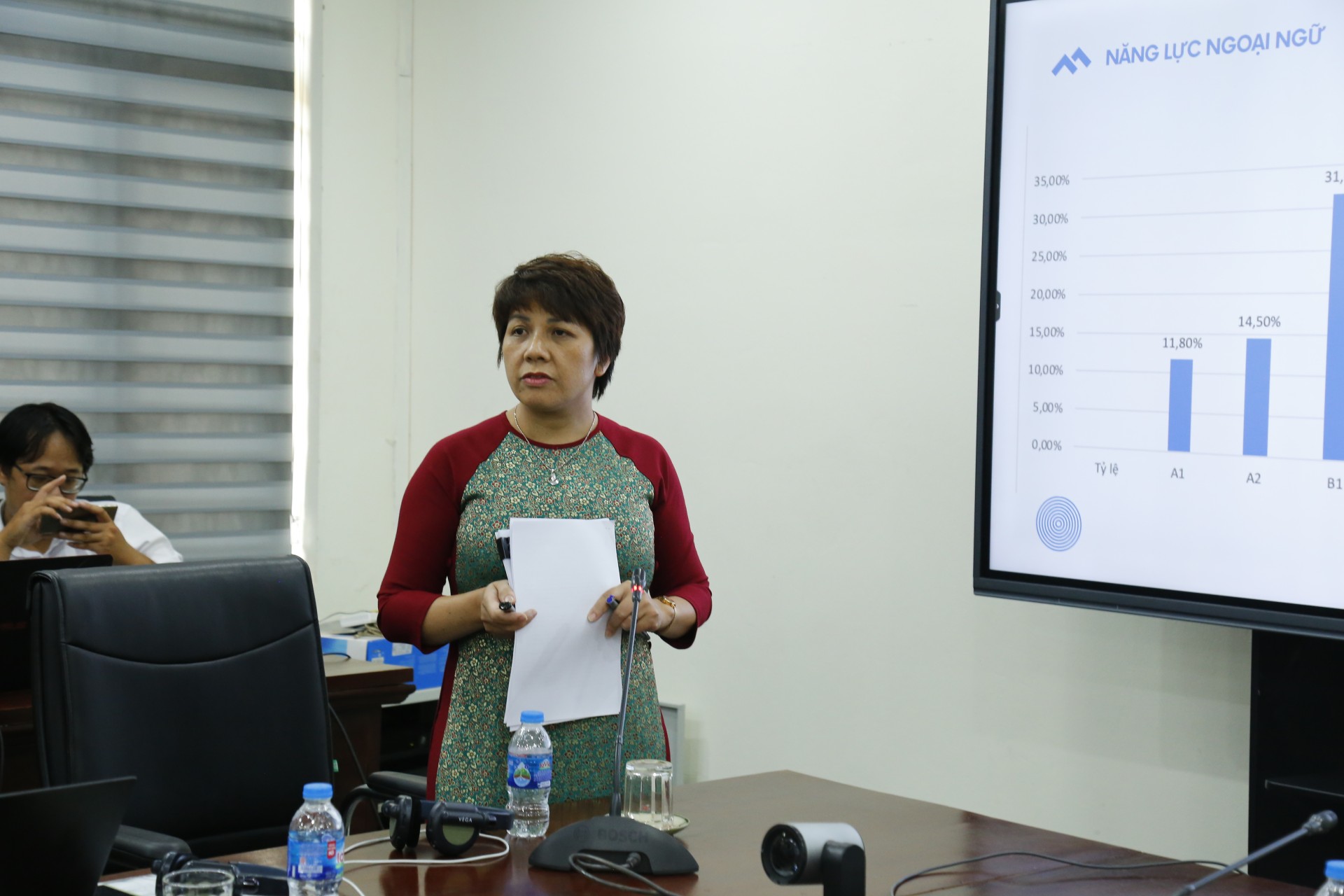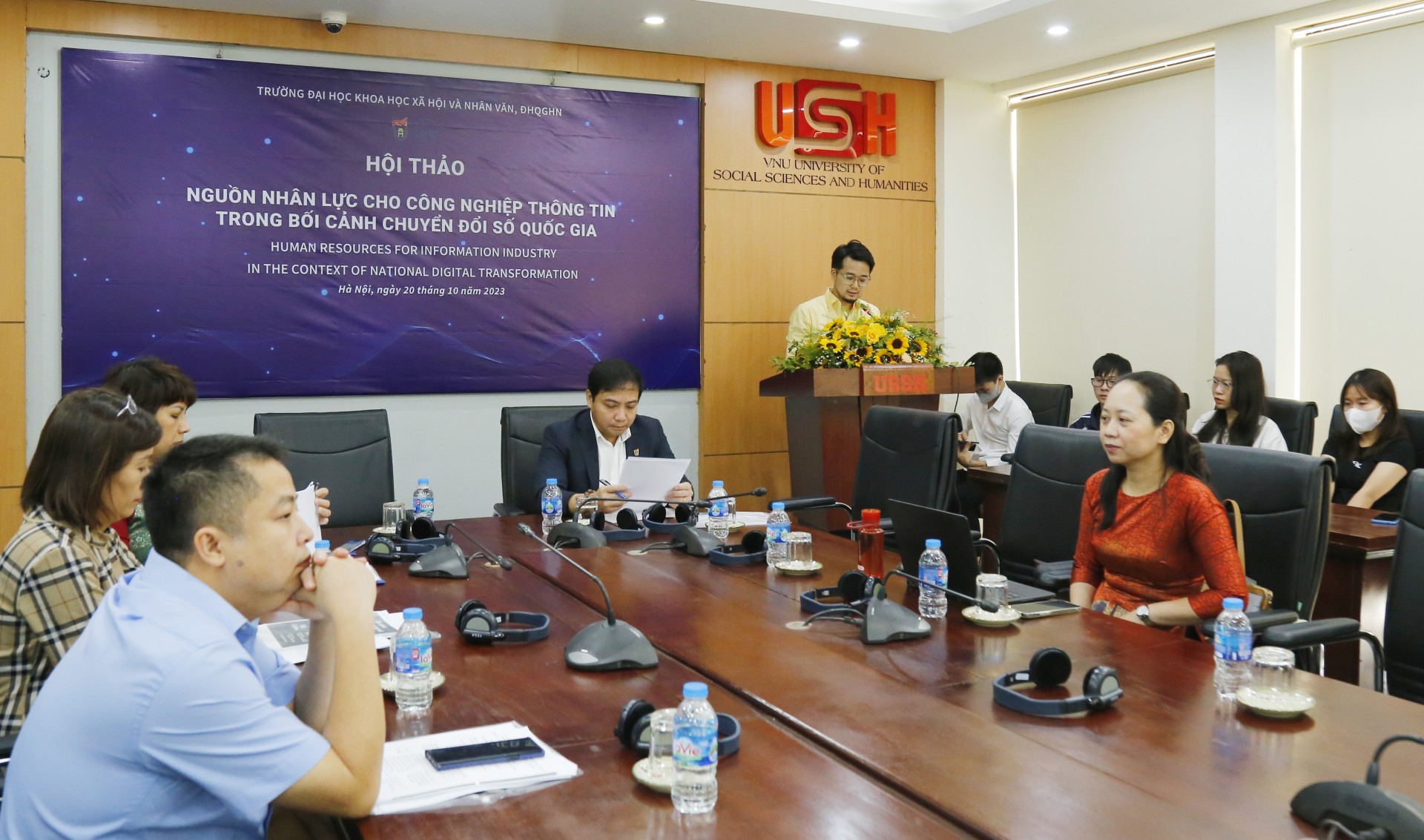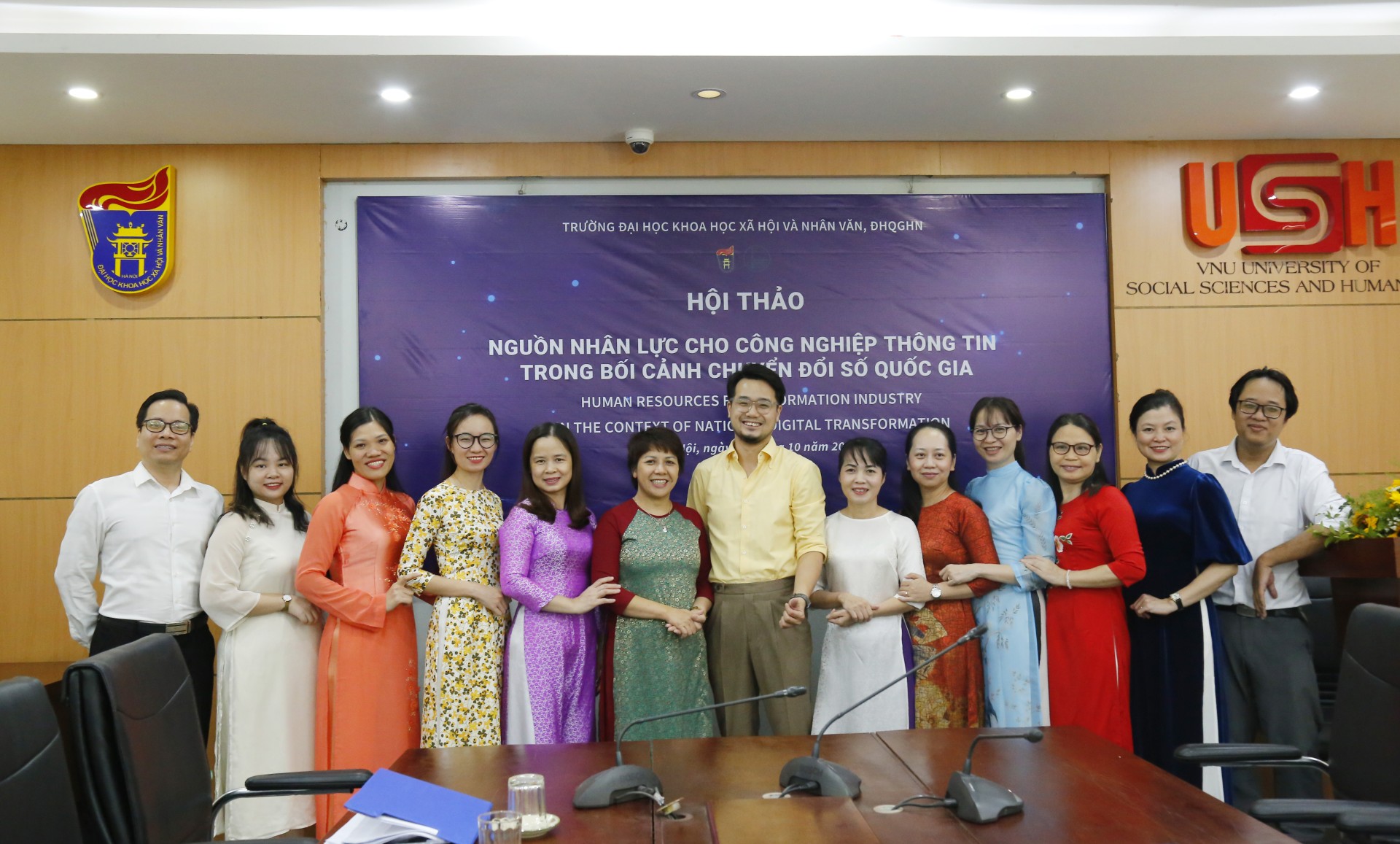In his opening remarks at the workshop, Associate Professor Dr. Dao Thanh Truong emphasized: In the digital transformation process, the information industry has become one of the important sectors impacting various aspects of socio-economic life. In the field of education, digital transformation truly brings many benefits to all aspects of training activities: from administration and management, innovation in curriculum content and training methods to teaching and learning methods, thereby significantly impacting the quality of education.
Vice Rector Dao Thanh Truong delivered the opening remarks at the workshop.
The theme of today's conference, "Human Resources for the Information Industry in the Context of National Digital Transformation," holds significant theoretical and practical importance. It aims to assess the quality of human resources in the information, library, and information management sectors in Vietnam, and identify global trends in human resource training. Based on this, training institutions can grasp trends and update their training programs to best meet the actual human resource needs. The conference also provides an opportunity for employers to propose, advise, and state their requirements for human resources in the current digital transformation context. The feedback received will be crucial in helping training institutions adjust their curriculum content to better equip learners with the necessary knowledge and skills to meet real-world demands.
With the presentation,Human resource management: recruitment, job placement, especially in the information technology field.Professor Sam Gyun Oh from Sungkyunkwan University provided a very insightful analysis: what is information, information technology, and how is information used? He emphasized that all forms of information drive progress in science, business, education, and culture; in the future, those working in information management in general, not just librarians, will play a crucial role in many fields, significantly influencing the development of an organization or business.When we talk about information and information management, we often think of traditional jobs related to libraries and information archiving. But in reality, people trained in information technology can thrive in some very new fields: healthcare."
Professor Marat Rakhmatullaev from Tashkent University of Information Technology, Uzbekistan, in his presentation on "Human Resource Requirements in the Information Services Sector for Digital Transformation in Education," affirmed that digital transformation in education means keeping pace with global scientific and technological advancements. Higher education must be constructive, producing high-quality graduates with the necessary skills to meet the demands of the current labor market – education by society, serving society; and equipping students with the capacity for lifelong learning.
Professor Marat Rakhmatullaev presented his report online.
Drawing from the highly successful public library model in Türkiye, Professor Bulent Yilmaz's presentation offered a valuable suggestion: Just three years after graduation, the knowledge acquired in university becomes outdated, especially in the context of rapid digital transformation and rapidly changing technology. Therefore, training needs to be conducted regularly, fostering self-learning among library administrators through diverse forms, including in-person, online, distance learning, and short-term courses. Libraries need to promote interaction between users and information resources.
Regular workshops should be organized to allow libraries to exchange experiences and share new research on information management, communication, mobile libraries, children's libraries, and more.
Professor Bulent Yilmaz from Hacettepe University, Türkiye, presented a paper entitled "Continuing Education Model: Theoretical Framework and Regional Workshops of Turkish Public Libraries".
Through a case study of the National Library of Vietnam, author Nguyen Thi Kim Dung's report indicated that, fundamentally, library staff possess professional expertise, perform their duties well, and meet the basic needs of readers. However, to keep pace with the rapidly evolving digital transformation, continued training, development, and enhancement of information technology skills, foreign language proficiency, and other soft skills are necessary for the library staff.
Dr. Nguyen Thi Kim Dung (Faculty of Information and Library Science, VNU-USSU) presented a paper entitled: Applying the ASK model to assess human resource capacity in the context of digital transformation in the Vietnamese library sector. A case study of the National Library of Vietnam.
Dr. Tran Thi Thanh Van presented a research paper on training master's degree human resources in information and library science at Hanoi National University during the transition period.
Dr. Bui Thanh Thuy presented a paper titled: Digital Competence in the Professional Development of University Librarians in Vietnam.
Based on actual research data, the report indicated that digital competence plays a significant role in helping librarians develop their careers in the future, especially key skills such as using library management software, accessing databases, and searching and evaluating information online.
Representatives from recruiting organizations emphasized the significant need for well-trained human resources in information management. However, in reality, many graduates, despite possessing in-depth knowledge of the field, lack practical application skills and essential abilities, particularly foreign language proficiency. Therefore, from the perspective of employers, business representatives hope that training institutions will make adjustments to their curriculum, increasing the amount of practical training and developing soft skills for students.
Ms. Nguyen Thuy Linh, Director of University Market at iGroup Vietnam, shared: "Currently, students majoring in information and library science have specialized knowledge but are weak in foreign language skills and understanding of the academic environment and international data sources. Every year, we need to recruit a number of staff, but if we hire students from other majors (who are good at foreign languages) but lack systematic and in-depth knowledge of information management, the agency has to retrain them, which takes a lot of time."
Mr. Hoang Dung, Director of D&L Technology Consulting and Integration Joint Stock Company, affirmed: Currently, job opportunities are extremely wide open for students training in library and information science and information management, and are no longer limited to becoming library staff.
"However, to meet market demands, especially in the age of technology, you must actively cultivate other skills besides the specialized knowledge that the University of Social Sciences and Humanities has provided so systematically," Mr. Hoang Dung emphasized.
Ms. Trinh Thu Ha (Library Manager at RMIT University) stated: "The demand for human resources in the information industry is enormous. Any business needs experts in information management (customer information, user information, market information, etc.). Therefore, career opportunities are no longer limited to the library sector but extend to other fields of information management and administration."
Concluding the workshop, Dr. Nguyen Thi Kim Dung – Deputy Head of the Faculty of Information and Library Science, University of Social Sciences and Humanities – once again emphasized: The workshop's theme attracted the attention of numerous scientists from both within and outside the country, with 20 papers presented, 6 papers delivered directly at the workshop, and many lively comments. All reports demonstrated serious research, high quality, and focused on the core content.
Reports and discussions at the workshop all assessed that the quality of human resources in the information management and information-library sectors in Vietnam is improving. However, this improvement still leaves a significant gap in the capacity of human resources to meet the demands of current digital transformation.
The fields of information management and information-library science are rapidly transforming with the integration of information technology, artificial intelligence, and data analytics. Training institutions and related organizations have recognized the importance of this trend and are updating their training programs to meet practical needs. Close collaboration between training institutions and employers will help to better understand the needs and opportunities in the labor market.
The workshop sparked interesting new research directions and offered useful suggestions for training institutions to innovate training programs in library and information science and information management to better meet the needs of the information industry workforce in the context of national digital transformation.
Some photos from the workshop.


















